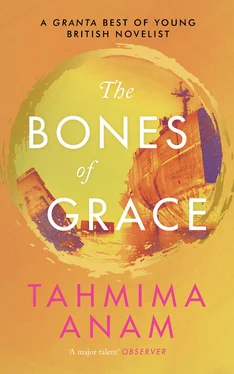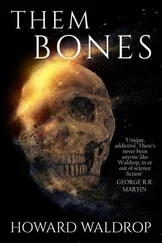It’s a long ride. I sleep, wake, listen to the playlist you made for me before we parted, write little notes to you in my mind that I will never send. Like this: what if you came with me? I think of the grand piano in Sanders, brass feet blending into the gold tones of the savannah. The veil, so close to my mouth, amplifies my breathing. We pass fields of millet. It isn’t all bare: spiky green bushes are dotted all over the rolling hills, with occasional bursts of colour, like the Translucent Honeysuckle, Lonicera quinquelocularis , which Jimmy points out when we change buses at Kashmore. I consider asking for the toilet, a dull pain spreading through my lower stomach, but I don’t want to leave Jimmy’s side. I realise, too late, that I’m not the adventurous type.
*
‘How shall we keep in touch?’ you asked at the airport, the smell of detergent and tired bodies our little anthem of departure.
‘The world presents you with an infinite number of possibilities,’ I said. ‘Text, email, phone, Skype. And sub-possibilities. iMessage, WeChat, WhatsApp, Snapchat.’
‘Your knowledge of the genre is impressive,’ you said.
‘I am never less than a thousand miles from someone I love.’
‘Letters?’
‘The post is abysmal. It’ll be ten years and I will have missed something crucial. Imagine the regret.’
‘Smoke signals?’
I had no reply to that.
‘Something encrypted,’ you explained.
‘I’m afraid I won’t get it. We have to make up the rules before we start.’
‘Okay, how about lines from Anna Karenina ?’
‘Too depressing.’
‘ Moby-Dick ?’
‘I’ve never read Moby-Dick .’
‘What kind of a cetophile are you? No books, then.’
‘How about songs?’
We looked at each other. There was only one answer. ‘Nina Simone,’ we both said at the same time.
‘I may stray a little,’ you said. ‘I can already think of a few standards she didn’t cover.’
‘You have something of an advantage.’
‘True. But you’ll catch up. Consider it an education.’
‘In restraint, or music?’ Because there would be so much more to say.
‘Both.’
Before my plane took off I looked up a list of jazz standards. ‘Love Me or Leave Me’. ‘Darn that Dream’. ‘Jonah and the Whale’. ‘Every Time We Say Goodbye’. ‘I Wish I Could Know What It Means to be Free’.
Professor Smith was leaning on a bolster, talking to a man in a beard and cap. ‘It’s a damn shame about Baluchitherium ,’ the professor was saying. ‘It could have changed everything.’ Changed everything is the holy grail for people like us. We look for the bones that will rewrite everything we have known about our history. We look for the ear of Pakicetus , the ankle of Ambulocetus , the spine of Rhodocetus . I knew what he meant — Baluchitherium may have yielded such bones, but it was never fully examined.
Everyone in the small world of cetacean palaeontology knew that Professor Bartholomew Smith had spent his entire career in this part of the world. That he spoke the regional dialect and dressed in the manner of the local tribesmen, in long cotton tunics and embroidered vests. Now I was seeing this something of a legend man in the flesh and finding him weathered and small, his body as if recently unpacked from within a very small space. He had a betel habit that had turned his mouth a lurid colour of red.
He saluted me with a hearty ‘As-salaam alaikum!’ I was cheered by the warmth in his voice and I liked him immediately, his manner open and slightly clownish. He insisted I call him Bart and he poured me a cup of creamy tea, which I accepted (in case you’re wondering, I pissed like the proverbial racehorse the moment I got to camp).
‘This is Zamzam,’ Bart said, introducing the other man. With narrow shoulders and a timid face, Zamzam appeared out of place, though he must have thought the same about me. I had removed my veil and the dust was making my eyes tear, and I had already developed something of a tic, rubbing the back of my neck to get rid of the grit that had started accumulating there. I sniffed, blew my nose into a crumpled tissue, and exchanged polite hellos with Zamzam. On the bare ground was a pot of curry and a platter of stone bread. I was offered a plate and helped myself. The bread lived up to its name and was very hard, but the curry was delicious, sweetened by dried prunes.
Bart went on about Baluchitherium . My eyes stopped streaming and I tried to remember everything I knew about it — I recalled it was discovered in Dera Bugti by an Englishman at the start of the twentieth century and was thought to be one of the largest mammals ever, a rhinoceros-like behemoth who roamed the earth 30 million years ago. Young, then, compared to Ambulocetus .
‘A group of French archaeologists dug it out of the ground in ’99, and it was decided the skeleton would be moved to Karachi for examination. In the meantime, they stored it in the home of the tribal chieftain of the time, you know, Akbar Bugti. When the army raided Bugti’s home, they blew up his compound, killed him, and everyone thought they’d wiped Baluchitherium off the face of the earth,’ Bart said.
I didn’t know the end of the story. ‘What happened?’
‘Bugti had all the bones stored in metal containers, the bastard!’ Bart slapped his hand against Zamzam’s back. ‘That’s why we’ve got to get Ambulocetus out of the ground and put it somewhere safe.’
Ambulocetus tells about the moment, somewhere around 50 million years ago, when whales began to swim. The earliest ancestor of the modern whale, Pakicetus , was discovered several hundred miles north of here, in Punjab. Pakicetus drank fresh water, had a marine-mammal ear and swam in the shallows. The last time this area had been excavated, Gingerich had found Artiocetus clavis and Rhodocetus balochistanensis , the two specimens that had proven that whales evolved from Artiodactyla, split-hoofed, plant-eating mammals such as cows and hippos. And Thewissen had found many specimens of Ambulocetus in 1992, but no one had been able to bring a full skeleton back from the field.
‘Gingerich was here in 2000, but they shut him down when the war in Afghanistan started,’ Bart said, removing a folder from his backpack.
I had been meaning to ask Bart about this. For over a decade no one had been allowed anywhere near here. ‘How did you get permission?’
He pulled out a sheet of paper from the folder and wielded it with a flourish. ‘Aha, here it is.’ He cleared his throat. ‘Imagine, if you will, Ambulocetus , the sun on her back, the edge of the water lapping at her thick skin, the temptation to plunge within too great, the secrets of the ocean beckoning.’ I cringed at hearing my words read back to me, checking to see if Jimmy and Zamzam were laughing or, worse, staring down at the fat coagulating on their plates, embarrassed for me. Bart went on, in the manner of a hazing ritual: ‘Her secrets lie within her bones: her hips, her protected inner ear that allows her to hear underwater, the length of her femur. These are the clues that will tell us who she is, so long a mystery beyond the reach of science.’
My face burned. ‘Seriously, though. I thought this area was strictly off limits.’
Bart flung my application back into the folder. Then he pulled a tin box out of his pocket and selected a heart-shaped sheet of betel. ‘You know countries like this,’ he said, folding the betel leaf into a triangular packet and popping it into his mouth. ‘You gotta find ways to get around.’
‘Bart’s been working on it 24/7,’ Jimmy said.
Читать дальше












